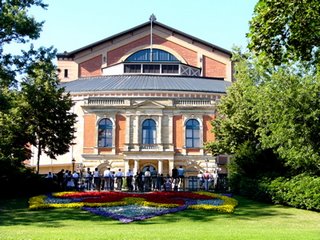The Bombing of Bayreuth

My friend Amanda Mace, with whom I went to UMKC, is singing in Bayreuth. This year she is singing one of the Valkyries in Walküre and next year she will sing Eva in Meistersinger. Anyway, she wrote me an email last week asking if I want to come and see one of the Final Dress Rehearsals of one of the shows. I said “hell yes”, of course.
To those of you who do not know: Bayreuth is the theater that Wagner, with the help of the Mad King of Bavaria (Ludwig II—yes, the one that built Neuschwanstein.), built to highlights his own works. The theatre was designed according to Wagner’s specifications and is still run by his direct descendants.
Basically, people who really love Wagner are a part of the sort of very strange cult that live in a completely different time period. They would be most like some kind of creative anachronist, but without the clothes. (At least those people can go back to their regular lives after a bit of jousting on the weekend.) Wagner fanatics tend to be intellectuals that take “affectation” to an entirely new level, almost taking that “crazy yet brilliant”, “weird but in a questionable way” thing to its most sheer, incredible edge.
I felt I was a casual observer in the proverbial lion’s den seeing Das Rheingold on Monday. I had studied Wagner extensively in a doctoral seminar that I had taken before coming here, so I already felt that I was “filled to the brim” with needless, pointless knowledge about the great man and Gesamtkunstwerk creator himself. (God, using this word is like some kind of fucked-up name-dropping. Oh well, it doesn’t stop it from being a cool word.) The other students of the course started with about the same mindset as myself when the course began: Wagner is an egomaniacal, anti-Semitic blowhard who was more of a conman than a genius. What is interesting is that, after studying him for that semester, I can safely say that our prejudices were only fulfilled and strengthened by our further knowledge of him and his “creations.”
The famous thing about the construction of Bayreuth is that Wagner designed it so that the orchestra plays under the stage. The sound comes out from a small slit that is in front of the stage. I never realized, though, that, in addition to this, there is a shell above this slit that redirects the sound onto the stage where it mixes with the singer’s sounds and then bounces back into the audience. I had always thought that the stage of Bayreuth was ideal for Wagner’s works because boxing up the orchestra meant that the singers didn’t have to sing their guts out just to get past the wall of sound that an orchestra can often be. That’s not really true, though. The singers all had big voices on Monday and they were using them pretty much to capacity the entire time. These brilliant “pianos” that I had always heard about coming from Bayreuth’s stage seemed either to have not happened at all, or maybe I just missed them.
The most surprising thing was how this “ingenious” idea of an operatic concept, that of putting the orchestra in a box, made all of the orchestra music sound extremely muddy and amorphous. All of the brilliant rising and falling violin articulations sounded like some kind of sonic swoop and the brass sounded like it was being broadcast from a Victrola. The singers, too, when their sound was mixed with this, tended to be very, perhaps too, homogenous in nature. It was like a big waft of sound came lulling over me from time to time, undulating not unlike a calming sea. That effect plus the fact that they performed it as the Great Master had intended it, from beginning to end without a break, meant that in this 2.5 hour multi-million dollar extravaganza, my eyelids were, yes, getting heavy. What a total traitor! A classical musician, and even Heldentenor almost fell asleep in Das Rheingold? Yes, it’s true.
But, whereas Wagner’s genius is often cited in his using secondary dominants, extending the typical tonal rhythm until one finally gets a great fulfillment when the whole thing resolves itself (for one second before moving on to something else...God, Wagner was such a CT. No, not ‘cock tease’, a ‘cadence tease’.), his genius should never be seen as the way that he actually ordered his operas. Das Rheingold is practically one voice singing after another, without any real melodies, no real ensembles, no big chorus scenes and no ballet. The whole thing is like some kind of souped-up recitative. I have some bad news for you Richard, no one wants to hear that for 2 and a half hours!
Wait, I’m obviously wrong. The place was packed, and will be sold out of every performance of everything they run this year, as it is every year. And, if you are wanting to come and see something, you had better apply for tickets now, because the waiting list in 7 years long.
Do you have to be German to love Wagner? No, but, it obviously really helps.

2 Comments:
"One can't judge Wagner's opera Lohengrin after a first hearing, and I certainly don't intend hearing it a second time."
Gioacchino Rossini
So, are you considering changing your fach? No more Heldentenor? ;o)
~Amie
Post a Comment
Subscribe to Post Comments [Atom]
<< Home